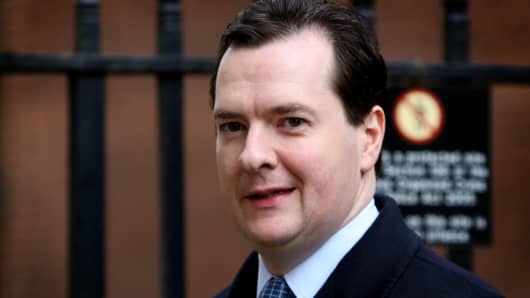There is plenty of temptation to crack open the champagne and celebrate the U.K.'s return to economic health, with even cautious Chancellor of the Exchequer George Osborne declaring victory was his.
Yet there are still several important reasons to be cautious about a series of better-than-expected economic indicators.
(Read more: U.K.'s economic recovery)
One of the most concerning is the prospect of another house price bubble forming. Interest rates have remained at a historic low for four and a half years, and the government has introduced measures like the Help to Buy scheme, where it guarantees mortgages for first-time buyers with relatively small deposits.
While this may be good for the government's approval ratings ahead of an expected election in 2015, particularly in London and the South East where the incumbent government is strongest, in the long term, there are concerns that it will burst.
Rob Wood, chief UK economist at Berenberg, and Neil Prothero, UK analyst at The Economist Intelligence Unit, are among those warning of the dangers of a new bubble forming. Wood warned of the "growing risk" house prices pose to the economy and called on the government to cancel planned housing schemes.
The growth which has occurred seems to some to be unsustainable.
For example, the amount of growth which is accounted for by increased government spending and taxation has risen. The cheap loans injected into the financial system by the Bank of England don't appear to have fueled employment growth or investment in the "real economy". Improvements in manufacturing output seem to have been made through increased productivity rather than fueling jobs growth.
The historic disparity between London and the South of England and the rest of the U.K. seems to be widening, particularly in house prices. In the North West, prices contracted are now 7.5 percent below the average prices in August 2008, compared to a 9.7 percent rise in London.
Much of the exports which helped drive recovery in the first half of the year can be accounted for by oil, which is a dwindling and unpredictably priced resource.
The decline in North Sea oil is one of the key concerns about the U.K.'s long term growth voiced by a group of influential economists,published on Tuesday by the Institute of Economic Affairs.
They warned that growth is "flatlining" at 1 percent, with U.K. growth still 3 percent below its 2008 peak.
The British government may have to keep the bunting in the attic for a while longer.
Follow Catherine on Twitter: @cboylecnbc



